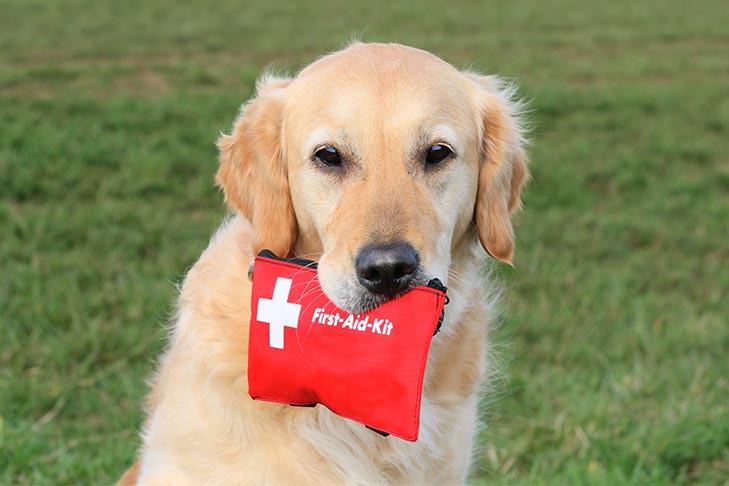Bringing home a new puppy is such an exciting experience—those tiny paws, playful barks, and wagging tails can brighten any day. But along with the fun comes responsibility. Puppies are naturally curious and love to explore, which sometimes means they get into a little trouble. That’s why it’s so important for every pet parent to know the basics of first aid. A little preparation can go a long way in keeping your furry friend safe, healthy, and happy.
In this guide, we’ll cover essential puppy first aid tips, common emergencies, and the must-have supplies every dog owner should keep on hand.

Why First Aid Matters for Puppy Owners
puppies are full of energy and curiosity they chew, explore, and dash around without a care in the world. But that adventurous spirit can sometimes lead to little mishaps, like
Cuts and scrapes
Choking hazards
Insect bites or stings
Heatstroke or hypothermia
Poisoning from food or household items
Having first aid knowledge for puppies helps you act quickly before you reach the vet. While first aid is never a replacement for professional care, it can stabilize your puppy until you get veterinary help.
First Aid Kit Essentials for Puppies
Every dog owner should have a puppy first aid kit at home and in the car. You can easily create your own or purchase a ready-made pet first aid kit that comes with the basics.
1. Digital Pet Thermometer – designed for animals to help monitor fever. A good option is the Digital Thermometer for Pets, which gives quick and accurate readings, making it easy to spot health concerns early.
2. Pet First Aid Kit – A ready-made kit with bandages, antiseptic wipes, and tools designed for pets.
3. Self-Adhesive Bandages – Gentle on fur and skin, perfect for covering small cuts or scrapes.
4. Pet-Safe Antiseptic Spray – Specially formulated to clean wounds without harming your pup.
5. Tick Remover Tool – Safer and more effective than regular tweezers.
6. Dog Cooling Mat – Prevents overheating during summer or after playtime.
7. Pet Poison Helpline Magnet/Guidebook – Quick access to emergency numbers and instructions.
8. Pet Insurance – Provides financial protection in case of accidents or emergencies.
Common Puppy Emergencies & First Aid Steps
1. Choking
Puppies often chew on toys, sticks, or household objects that may block their airway.
- Look inside their mouth and carefully remove any visible object with tweezers.
- If you can’t remove it, perform the dog Heimlich maneuver: place your hands just below the rib cage and give firm upward thrusts.
- Always follow up with a vet visit.
One of the best ways to reduce choking risks is by offering safe chew toys instead of household items. For example, Flex-N-Chew Bones are designed to satisfy your puppy’s chewing instincts while being safer than sticks or random objects.
2. Cuts and Scrapes
Minor injuries are common for adventurous puppies.
- Clean the wound with warm water and a pet-safe antiseptic spray.
- Apply sterile gauze and wrap gently with self-adhesive vet bandages.
- For deep cuts or continuous bleeding, head to the vet immediately.
3. Heatstroke
Puppies can overheat quickly, especially in summer. Signs include heavy panting, drooling, weakness, or collapse.
- Move your puppy to a cool, shaded area.
- Offer small amounts of cool (not cold) water.
- Place a damp towel on their paws and belly.
- Using a dog cooling mat at home can help prevent overheating during hot days.
- Seek veterinary help right away.
4. Poisoning
Common puppy toxins include chocolate, grapes, xylitol (in sugar-free gum), and household cleaners.
- Call your vet or pet poison control hotline immediately.
- Do NOT induce vomiting unless specifically instructed by a vet.
- Keeping a pet poison guidebook or magnet with hotline numbers is a smart addition to your first aid kit.
5. Insect Bites & Stings
Bee stings and bug bites can cause swelling or allergic reactions.
- Remove the stinger if visible with tweezers.
- Apply a cold compress or ice pack.
- If swelling spreads or breathing is affected, rush to the vet.
For ongoing protection against fleas and ticks in your home, a safe option like Adams Plus Flea & Tick Carpet Spray can help keep your environment pest-free.
Tips for Staying Prepared
Stay calm in emergencies your puppy will sense your stress.
Take a pet first aid course many local vets or online platforms offer them.
Save your vet’s emergency number in your phone.
Puppy-proof your home by removing toxic plants, electrical cords, and choking hazards.
Consider pet insurance it can make emergencies less stressful financially.
Final Thoughts
Being prepared with puppy first aid basics gives you peace of mind and could save your pet’s life. Remember, first aid is only the first step always consult your veterinarian after an emergency. With the right knowledge and tools, you’ll be ready to keep your furry companion safe and healthy.
Frequently Asked Questions About Puppy First Aid
1. Do puppies really need a first aid kit?
Yes. Puppies are curious and can get injured easily. A kit helps you handle small emergencies before reaching the vet.
2. What is the first thing I should do if my puppy is hurt?
Stay calm, keep your puppy still, and check the injury. Then call your vet for advice.
3. How can I tell if my puppy is in pain?
Signs include whining, limping, refusing food, hiding, or acting differently than usual.
4. What temperature is normal for puppies?
Between 101°F and 102.5°F. Anything higher could be a fever use a digital thermometer to check.
5. What should I do if my puppy is choking?
Look inside their mouth and remove the object if possible. If not, perform the dog Heimlich and call your vet.
6. Can I give human medicine to my puppy?
No. Many human medicines are unsafe for dogs. Always ask your vet first.
7. What are the most common puppy emergencies?
Choking, cuts, heatstroke, poisoning, and insect bites are the most common.
8. How can I prevent accidents with my puppy?
Puppy-proof your home, provide safe chew toys, and keep toxic foods and plants out of reach.
